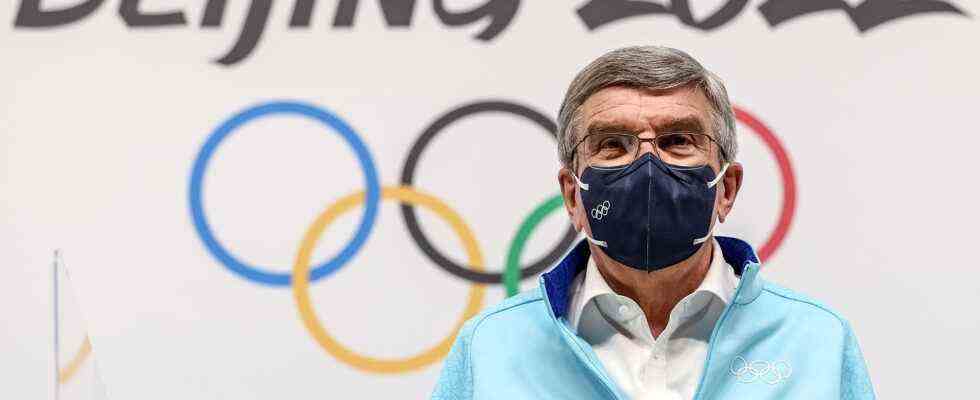Status: 04.02.2022 3:27 p.m
For athletes, the Olympics are the high point of their careers, for the IOC it’s a growing billion-dollar business. When competing for attention, many sponsors in Beijing are likely to have a queasy feeling.
When the Olympic Winter Games begin today in Beijing and the athletes fight for medals in front of sports officials and sponsor representatives in the VIP stands, business for the International Olympic Committee (IOC) has long since run out. Even at the Winter Games, the scale of which does not reach the size of the summer competitions, the IOC, under the leadership of its President Thomas Bach, can look forward to billions in revenue – mainly from the sale of TV rights and, to a much lesser extent, from ticket sales.
The current earnings are not yet known, but it would be surprising if the billion mark were not easily cracked again. From the 1998 Nagano Games in Japan to the 2018 Winter Olympics in Pyeongchang, South Korea, revenue has practically tripled from $0.59 billion to $1.58 billion. The billion was broken for the first time in Vancouver, Canada in 2010 with 1.53 billion and in Sochi, Russia, in 2014 with 1.49 billion.
Millions for athletes and sports organizations
In addition, there is the money that the IOC receives from corporate sponsorship and other sources. In the Olympic cycle from 2013 to 2016, which included the games in Sochi and Rio de Janeiro, a total of 5.7 billion dollars was taken, according to the IOC. What happened to it? According to the IOC, 90 percent of the income from the Olympic Games went directly back to the sport, around 60 percent to support the host city of the upcoming games.
The IOC does not work as a profit-oriented organisation, the income is used to support athletes and sports organizations – according to their own statements, 3.4 million dollars are distributed to them every day.
Sponsors donate billions
But what is the proportion of sponsorship money that has to be added to the TV and ticket income? “Quartz”, a New York Internet portal for business news, has dealt with this part of the income from the Olympic Games in recent years and also takes a look into the future. According to the research, the IOC received around two billion dollars from sponsors in the period from 2017 to 2020. From 2021 to 2024 it should already be three billion.
The Olympics in Beijing is not the best environment for global corporations to post their advertising messages. The Winter Games are viewed critically by the public because of the issues of sustainability and environmental protection. Above all, however, Chinese human rights violations are the reason why states such as the USA, Canada and Great Britain are boycotting Beijing politically.
How serious are the companies?
According to the Financial Times (FT), the 13 top global sponsors of the IOC, which include Coca-Cola, Allianz, Airbnb, Toyota, Alibaba, Omega, Intel, Samsung and Panasonic, are mostly silent when asked to comment on the human rights situation of the Uyghurs in China. Or they prefer general, vague explanations. The US news channel CNN quotes the Swiss watch manufacturer Omega as saying that they intend to focus on measuring the respective sporting results with the utmost precision.
“We do not believe that our sponsorship devalues our global commitment to human rights,” said Steve Rodgers, Intel’s top executive, according to CNN. As CNN further reports, however, representatives of the Allianz insurance group, for example, have met with Uyghur activists.
In any case, human rights activists doubt the seriousness of corporate social commitments when corporations do not want to comment on the situation of the Uyghurs in China. “No company can credibly claim to have a serious concern for environmental, social and corporate governance, or human rights policies, if it remains silent in the face of the second most powerful government in the world that commits crimes against humanity,” the FT quoted Sophie Richardson of Human Rights Watch as saying .
Long-term sponsorship contracts
On the one hand, however, it must be taken into account that sport and the Olympic Games have long been a global phenomenon that is covered by the media practically worldwide. Human rights, sustainability and environmental protection are not as important everywhere as in the so-called western community of values.
In addition, many sponsors accompany the IOC for many years. The upcoming Olympic Games will be held in Paris in 2024, the next Winter Games in Milan in 2026, followed by the Summer Games in Los Angeles in 2028. The hopes that the issue of human rights violations in the host countries will only play a subordinate role are justified. And Beijing will be long forgotten.

